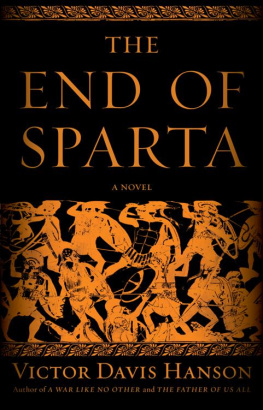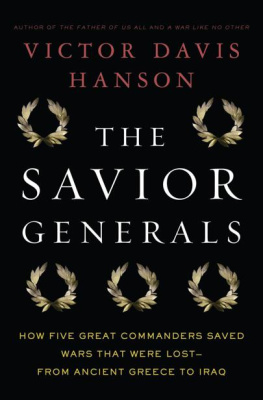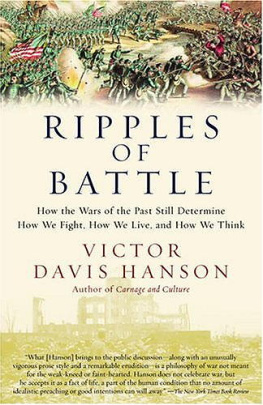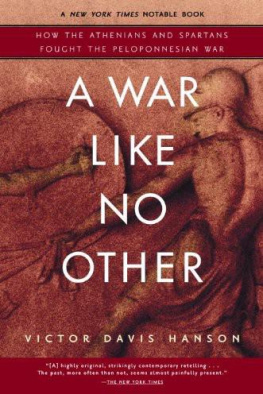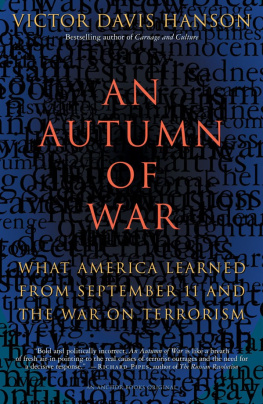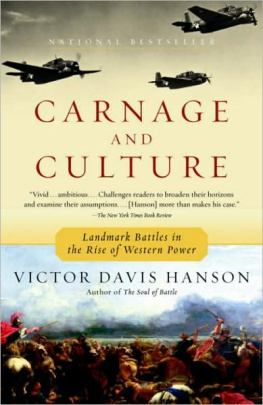Victor Davis Hanson - The End of Sparta
Here you can read online Victor Davis Hanson - The End of Sparta full text of the book (entire story) in english for free. Download pdf and epub, get meaning, cover and reviews about this ebook. year: 2011, publisher: Bloomsbury USA, genre: Detective and thriller. Description of the work, (preface) as well as reviews are available. Best literature library LitArk.com created for fans of good reading and offers a wide selection of genres:
Romance novel
Science fiction
Adventure
Detective
Science
History
Home and family
Prose
Art
Politics
Computer
Non-fiction
Religion
Business
Children
Humor
Choose a favorite category and find really read worthwhile books. Enjoy immersion in the world of imagination, feel the emotions of the characters or learn something new for yourself, make an fascinating discovery.
- Book:The End of Sparta
- Author:
- Publisher:Bloomsbury USA
- Genre:
- Year:2011
- Rating:5 / 5
- Favourites:Add to favourites
- Your mark:
- 100
- 1
- 2
- 3
- 4
- 5
The End of Sparta: summary, description and annotation
We offer to read an annotation, description, summary or preface (depends on what the author of the book "The End of Sparta" wrote himself). If you haven't found the necessary information about the book — write in the comments, we will try to find it.
The End of Sparta — read online for free the complete book (whole text) full work
Below is the text of the book, divided by pages. System saving the place of the last page read, allows you to conveniently read the book "The End of Sparta" online for free, without having to search again every time where you left off. Put a bookmark, and you can go to the page where you finished reading at any time.
Font size:
Interval:
Bookmark:

Contents
Part One.| Chapter One. |
| Chapter Two. |
| Chapter Three. |
| Chapter Four. |
| Chapter Five. |
| Chapter Six. |
| Chapter Seven. |
| Chapter Eight. |
| Chapter Nine. |
| Chapter Ten. |
| Chapter Eleven. |
| Chapter Twelve. |
| Chapter Thirteen. |
| Chapter Fourteen. |
| Chapter Fifteen. |
| Chapter Sixteen. |
| Chapter Seventeen. |
| Chapter Eighteen. |
| Chapter Nineteen. |
| Chapter Twenty. |
| Chapter Twenty-one. |
| Chapter Twenty-two. |
| Chapter Twenty-three. |
| Chapter Twenty-four. |
| Chapter Twenty-five. |
| Chapter Twenty-six. |
| Chapter Twenty-seven. |
| Chapter Twenty-eight. |
| Chapter Twenty-nine. |
| Chapter Thirty. |
| Chapter Thirty-one. |
| Chapter Thirty-two. |
| Chapter Thirty-three. |
| Chapter Thirty-four. |
| Chapter Thirty-five. |
| Chapter Thirty-six. |
| Chapter Thirty-seven. |
| Chapter Thirty-eight. |
This is the story of the great march against Sparta, the dream of the general Epaminondas of classical Thebes, whom the ancient Greeks and Romans acclaimed as the greatest man the classical world produced. Today we hear little of him. We know even less about all that his armies accomplished in a dramatic two-year period between 371 and 369 B.C.
Most contemporary accounts of that war were long ago lost. Our few extant historians apparently did not like the Thebans and so often misrepresented them or left them out of their narratives entirely. Most often Greek writers focused instead on Sparta and Athens. All that helps to explain why Epaminondas has faded from our memoriesand why I offer a novel about what he accomplished.
Sometime in July 371 B.C., the Theban Epaminondas and his Boiotian Greeks shattered the phalanx of the supposedly invincible Spartans at the battle of Leuktra. They killed the Spartan king Kleombrotos, and crushed his warrior elite. The next year, not content with that stunning victory, Epaminondasa follower of the philosopher Pythagoras who believed that our souls lived beyond our bodies and were judged by our deeds during our incarnate existenceled a grand coalition of Greeks southward to overrun Sparta.
The plan was to liberate the people of the Peloponnesos and apparently to reorder Greece itself. They were to found great citadels to hem in a weakened Sparta, and to free forever the serfs of its colony across the mountains in Messenia. That way, Epaminondas might cripple Sparta by robbing it of agricultural labor and thus ensure that no Greek people should be serfs to other Greeksand that the Spartans, like other Greek militiamen, would finally have to grow their own food rather than train constantly for war.
Still, we cannot quite fathom all the reasons why tens of thousands followed this mystic generalplunder of course, strategic necessity probably, idealism perhaps. We only know that his preemptive invasion of the Peloponnesos began the end of Spartaat least as the preeminent power as the Greeks had known it for centuries.
Nor do classical scholars understand the degree to which Pythagorean idealism energized these Theban liberators. Pythagoras was always a shadowy figure even to the Greeks. He had long been dead by the time of Epaminondas. Contemporaries derided Pythagoreans and their practices as a subversive cult. They certainly seemed strange. The embrace of vegetarianism, equality between the classes and sexes, reincarnation, reverence for natures harmony and order, avoidance of extremes, and fascination with numerical symmetries all frightened traditional Greeks. Apparently the soul could achieve its lasting perfection and rest only by denying the earthly appetites. It was almost considered trapped within matter of some sortin cyclical fashion reentering a plant, an animal, or a human until it was cleansed of temptation, and at last set free to become incorporeal and immortal.
The divine was visible around us for those willing to train hard to appreciate it. Prime numbers cannot be divided. Man, not nature, creates artificial and unnatural notions of diet. Social intercourse and rank should be dissolved. Plants and animals have souls and are one with men and thus sacrosanct. Suppression of the ego and material acquisition alone help us to glimpse the godly.
For the Pythagorean farmer, the divine was found by cultivating symmetry out of savage chaos. For the statesmen, the ideal was to return men to their naturally free state without arbitrary rank. For the citizen, he should avoid eating meat and not be embarrassed of using the leftand traditionally unluckyhand. Somehow for Epaminondas and his circle all that translated into an idealism of freeing the serfs of Spartaor at least the philosophical veneer of a shrewd strategy to weaken rival Spartan military power.
The catalysts of this story of Epaminondas are the farmers of the clan of the MalgidaiMlon, his slaves Chin and Nto, and their fellow rustics from the highland orchards and vineyards of Mt. Helikon. These charactersunlike most others in the novelare not found in the historical record, but they are the sort of people who so often appear as farmers in the Works and Days of Hesiod, various comedies of Aristophanes, and the letters about rural life that have come down to us under the name of Alciphron.
A word is needed on the use of dialogue. How can Greek-speaking literary characters, belonging to a foreign world some 2,500 years past, sound authentically ancient and yet be understandable to a modern English reader?
Classical Greek authors themselves wrote in what we today might call a formal style. Their own elevated vocabulary and complex syntax certainly were not realistic, and would have been recognized as such by the proverbial man in the street. Indeed, both public orations and recorded private dialoguewhether found in Thucydidess history, Platos repartee, or the verses of Sophocleswere not intended to reflect actual speech.
Much less did Greek prose mimic the spoken word heard daily in a Thebes or Athens. Even at their most colloquial expression, Greek literary prose and poetry were a world away from the accessibility of American popular slang.
So I have tried to strike a balanceavoiding both the extremes of the formal prose of nineteenth-century English historical fiction (written in large part by novelists who knew Greek and Latin and emulated the complex syntax of ancient authors), and the now common practice of making ancient people sound as if they were American suburbanites.
My editor at Bloomsbury Press, Peter Ginna, offered countless editorial suggestions that have improved the narrative. Glen Hartley and Lynn Chu of Writers Representative once again proved invaluable friends, advisors, and agents. I profited a great deal from close readings of the manuscript by Curtis Easton, Susannah Hanson, Jennifer Heyne, Raymond Ibrahim, Yishai Kabaker, and Bruce Thornton. I would also like to thank the editorial staff at Bloomsbury Press for editing, advice, and patience in bringing the book to fruition.

PART ONE
CHAPTER 1
A cart approached raising a high dust trail. A few more hoplite soldiers for the outmanned army?
Next pageFont size:
Interval:
Bookmark:
Similar books «The End of Sparta»
Look at similar books to The End of Sparta. We have selected literature similar in name and meaning in the hope of providing readers with more options to find new, interesting, not yet read works.
Discussion, reviews of the book The End of Sparta and just readers' own opinions. Leave your comments, write what you think about the work, its meaning or the main characters. Specify what exactly you liked and what you didn't like, and why you think so.

